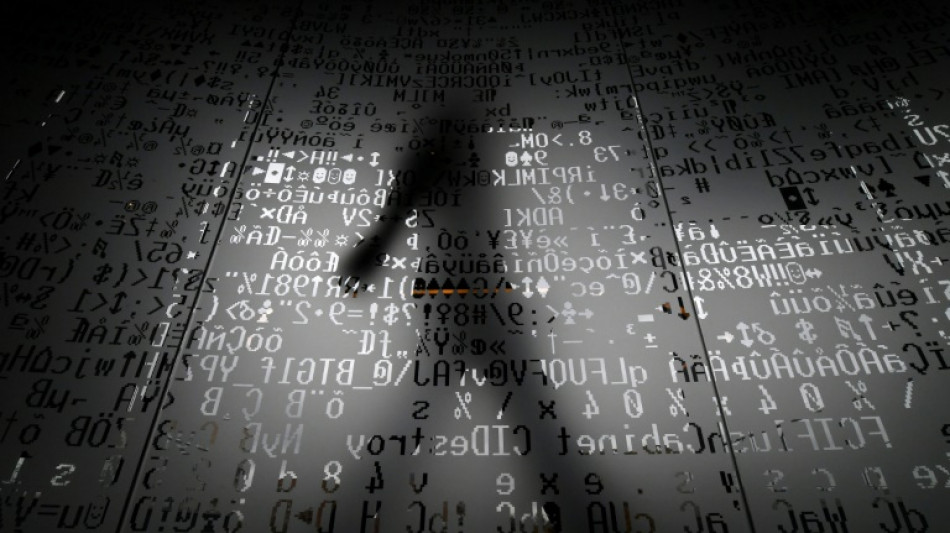
-
 France's second woman premier makes surprise frontline return
France's second woman premier makes surprise frontline return
-
France's Macron announces fourth government of the year

-
 Netanyahu tells Israel parliament 'some progress' on Gaza hostage deal
Netanyahu tells Israel parliament 'some progress' on Gaza hostage deal
-
Guatemalan authorities recover minors taken by sect members

-
 Germany's far-right AfD holds march after Christmas market attack
Germany's far-right AfD holds march after Christmas market attack
-
European, US markets wobble awaiting Santa rally

-
 Serie A basement club Monza fire coach Nesta
Serie A basement club Monza fire coach Nesta
-
Mozambique top court confirms ruling party disputed win

-
 Biden commutes almost all federal death sentences
Biden commutes almost all federal death sentences
-
Syrian medics say were coerced into false chemical attack testimony

-
 NASA solar probe to make its closest ever pass of Sun
NASA solar probe to make its closest ever pass of Sun
-
France's new government to be announced Monday evening: Elysee

-
 London toy 'shop' window where nothing is for sale
London toy 'shop' window where nothing is for sale
-
Volkswagen boss hails cost-cutting deal but shares fall

-
 Accused killer of US insurance CEO pleads not guilty to 'terrorist' murder
Accused killer of US insurance CEO pleads not guilty to 'terrorist' murder
-
Global stock markets mostly higher

-
 Not for sale. Greenland shrugs off Trump's new push
Not for sale. Greenland shrugs off Trump's new push
-
Sweden says China blocked prosecutors' probe of ship linked to cut cables

-
 Acid complicates search after deadly Brazil bridge collapse
Acid complicates search after deadly Brazil bridge collapse
-
Norwegian Haugan dazzles in men's World Cup slalom win

-
 Arsenal's Saka out for 'many weeks' with hamstring injury
Arsenal's Saka out for 'many weeks' with hamstring injury
-
Mali singer Traore child custody case postponed

-
 France mourns Mayotte victims amid uncertainy over government
France mourns Mayotte victims amid uncertainy over government
-
UK economy stagnant in third quarter in fresh setback

-
 Sweden says China denied request for prosecutors to probe ship linked to cut undersea cables
Sweden says China denied request for prosecutors to probe ship linked to cut undersea cables
-
African players in Europe: Salah leads Golden Boot race after brace

-
 Global stock markets edge higher as US inflation eases rate fears
Global stock markets edge higher as US inflation eases rate fears
-
German far-right AfD to march in city hit by Christmas market attack

-
 Ireland centre Henshaw signs IRFU contract extension
Ireland centre Henshaw signs IRFU contract extension
-
Bangladesh launches $5bn graft probe into Hasina's family

-
 US probes China chip industry on 'anticompetitive' concerns
US probes China chip industry on 'anticompetitive' concerns
-
Biden commutes sentences for 37 of 40 federal death row inmates

-
 Clock ticks down on France government nomination
Clock ticks down on France government nomination
-
'Devastated' Australian tennis star Purcell provisionally suspended for doping

-
 Mozambique on edge as judges rule on disputed election
Mozambique on edge as judges rule on disputed election
-
Mobile cinema brings Tunisians big screen experience

-
 Philippines says to acquire US Typhon missile system
Philippines says to acquire US Typhon missile system
-
Honda and Nissan to launch merger talks

-
 Police arrest suspect who set woman on fire in New York subway
Police arrest suspect who set woman on fire in New York subway
-
China vows 'cooperation' over ship linked to severed Baltic Sea cables

-
 Australian tennis star Purcell provisionally suspended for doping
Australian tennis star Purcell provisionally suspended for doping
-
Asian markets track Wall St rally as US inflation eases rate fears

-
 Luxury Western goods line Russian stores, three years into sanctions
Luxury Western goods line Russian stores, three years into sanctions
-
Wallace and Gromit return with comic warning about AI dystopia

-
 Philippine military says will acquire US Typhon missile system
Philippine military says will acquire US Typhon missile system
-
Afghan bread, the humble centrepiece of every meal

-
 Honda and Nissan expected to begin merger talks
Honda and Nissan expected to begin merger talks
-
'Draconian' Vietnam internet law heightens free speech fears

-
 Israeli women mobilise against ultra-Orthodox military exemptions
Israeli women mobilise against ultra-Orthodox military exemptions
-
Asian markets track Wall St rally as US inflation eases rate worries

| RBGPF | 0% | 60.5 | $ | |
| CMSC | 0.33% | 23.939 | $ | |
| SCS | -1.56% | 11.56 | $ | |
| GSK | 1.05% | 33.957 | $ | |
| CMSD | -0.04% | 23.55 | $ | |
| NGG | 0.71% | 58.92 | $ | |
| BTI | -0.42% | 36.09 | $ | |
| RIO | 0.64% | 59.015 | $ | |
| AZN | 1.28% | 66.195 | $ | |
| BP | 0.44% | 28.725 | $ | |
| BCC | -0.02% | 122.72 | $ | |
| RYCEF | -0.69% | 7.22 | $ | |
| RELX | 0.09% | 45.51 | $ | |
| VOD | -0.36% | 8.36 | $ | |
| BCE | -2.07% | 22.69 | $ | |
| JRI | 0.01% | 12.061 | $ |

The battle to keep Russia's internet free
Western powers have seized the yachts of Russian oligarchs and booted Russian banks out of the international system in response to the Ukraine invasion, but sanctions that limit access to the internet are proving highly divisive.
Ukraine has called loudly for a widespread boycott and Kyiv has even pushed for Russia to be cut off from the world wide web.
International sanctions have seen companies including big tech firms halt operations in Russia, and EU bans on Russian state media outlets have prompted the Kremlin to ban platforms including Facebook and Instagram.
Critics say all of this could well marginalise opponents of the Kremlin, boost the dominance of state media and even lead Russia to try to develop a sealed-off, local version of the internet.
"It's just severing the few remaining ties to the free flow of information and ideas," says Peter Micek of Access Now, an NGO that campaigns for digital rights.
A Kremlin crackdown on journalists has already drastically reduced independent sources of information, forcing many media outlets to close or scale back their operations.
Most international social networks are now available only through virtual private networks (VPNs), with figures for VPN downloads suggesting plenty of Russians are following this path.
But with web access being squeezed from the inside and the outside, many experts are now calling for the West to take a different approach.
- 'Hearts and minds' -
"Sanctions should be focused and precise," some 40 researchers, activists and politicians wrote in an open letter last week.
"They should minimise the chance of unintended consequences or collateral damage. Disproportionate or over-broad sanctions risk fundamentally alienating populations."
The letter called for military and propaganda outlets to be targeted.
Other experts point out that punishing Russia by closing off the internet is both technically and politically tricky.
Ukraine called global regulator ICANN to do just this on February 28, but the request was rejected.
"If you try to stop traffic from getting in through the window, it just comes through the cellar instead," explains Ronan David of Efficient IP, a firm specialised in securing computer networks.
For Micek, it is simply "counterproductive to the effort to win hearts and minds and spread democratic messages".
"Because the only counter-narrative, the only other narrative is coming from the Kremlin," he says.
Natalia Krapiva, a lawyer with Access Now, highlights that people exposed to those narratives may well conclude that "Russia is trying to help Ukrainians and is protecting itself".
In this context, Western sanctions may seem "completely unfair", she says.
- Fears of 'splinternet' -
The big fear is that the war and the deepening freeze in relations between Russia and the West will lead the Kremlin to develop its own internet.
China has already built a vast system of control around its internet, dubbed the "Great Firewall", which in effect cuts it off from the rest of the world.
Recent developments in Russia have led some commentators to speculate that the world faces the creation of a "splinternet", anathema to those who campaign for equal access across the globe.
"The Russians are quite capable of building a national internet," says Pierre Bonis of Afnic, the association that manages the .fr domain.
But he says it would be a pale imitation of the global internet.
"We must not break the universality of the internet, even if the Russians do unacceptable things," he says.
But China is not the only country to have invested heavily to build a closed internet.
Micek points out that Iran has spent a decade building its own controlled, censored version of the web.
"We feel that US sanctions are sort of encouraging Iran to build this functioning national internet by depriving Iranian businesses of basic Google, Amazon and other platforms and resources," he says.
And he can see a similar process at play with Russia.
"The people in Russia and Belarus have so little access to information that depriving them of internet services will send them further into Putin's fist," he says.
O.Johnson--AMWN

